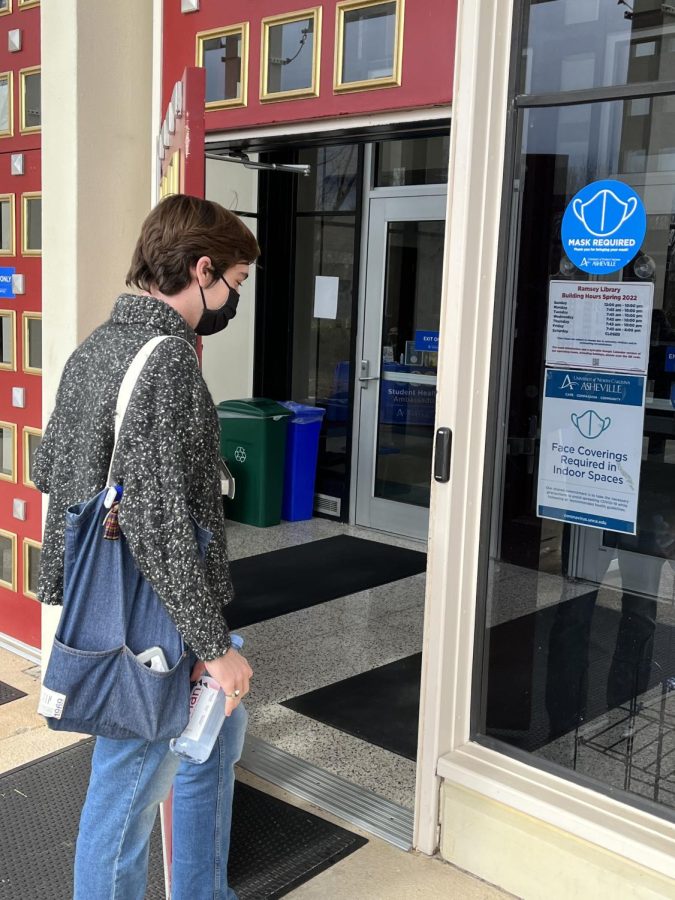Why strict attendance policies are more hurtful than helpful for students
Student Lucien Grillet complies with mask guidelines posted next to him as he walks into Ramsey Library.
March 3, 2022
Being a student can be overwhelming. Between hours long classes, homework, extracurriculars and in some cases working after school, most students’ schedules are completely booked. Throw trying to navigate a global pandemic in the mix and you have the perfect recipe for stress.
Educators and students alike are having to adjust to a wide range of new policies to help combat the spread of COVID-19 such as wearing masks, getting regularly tested for COVID-19 and social distancing when possible. However, there is one policy that hasn’t undergone much change: attendance grading and rewards for perfect attendance.
While K-12 schools have universal attendance policies in place, most universities leave attendance policies up to the discretion of the professor. This allows professors to choose what is an acceptable amount of classes to miss without a valid or provable excuse, as well as what consequences result after missing too many classes.
This semester, the attendance policies in place in each of my classes are different. In one course, I can miss only three classes and can request a fourth absence if I am exposed to or contract COVID-19. This course does not offer the option to attend class via Zoom.
In another class, more than one unexcused absence lowers my participation grade and more than three unexcused absences result in an administrative drop from the course. This course does allow for students to Zoom in if they cannot attend, but they have to ask a friend in the course to Zoom them in from the classroom.
On the surface, these policies might seem reasonable, but when you examine them closer, they are deeply flawed, reeking of ableism and classism.
According to UNC Asheville’s Office of Accessibility website, class attendance remains critical to student performance in their courses where they are expected to follow attendance policies instructed by their professors.
If a student at UNCA has a chronic illness or health-related disability that would affect their attendance in class, they have to fill out a reasonable attendance adjustment form for each class they are taking. Seasonal illness, temporary impairments and health conditions that are not on record with the Office of Academic Accessibility are not subject to reasonable attendance adjustments.
First of all, these attendance policies do not take into consideration current COVID-19 isolation and quarantine guidelines. According to the CDC, people who are vaccinated or have tested positive for COVID-19 within the past 90 days, do not need to quarantine if they’ve been exposed unless they have symptoms.
Unvaccinated people, or people who are not up to date on their vaccines, still need to quarantine for five days. If they have been exposed, they must wait until the end of those five days to receive a test and if they take a PCR test it adds an additional two to three days for results to come in. People who test positive or begin experiencing symptoms would have to quarantine for at least 10 days, resetting the quarantine time back to zero if they develop symptoms.
Even with the new quarantine and isolation guidelines, many students fully vaccinated or not can still feel uncomfortable attending class knowingly exposed to COVID-19 before getting back a negative test result.
This means if a student is exposed or tests positive and has to miss a class that meets twice a week, a student just waiting for test results would miss one or two classes. A student who tests positive or develops symptoms would have to miss at least three or four classes.
Without offering a Zoom option, a student just getting exposed to COVID one time would use all of their available absences, if not more, for the semester if the professor used a similar attendance policy to my professors this semester.
The policies to receive an excused absence from class requires a doctor’s note or another provable excuse. These policies assume all students have the capability to go to a doctor whenever they are not feeling well in order to receive a doctor’s note.
Going to the doctor can be costly, especially for students who are seeing a doctor off-campus. Getting seen by a doctor in a timely manner in order to get a sick note on time is another hurdle.
Another issue these policies do not take into consideration is the mental health of students. According to Active Minds, a non-profit promoting mental health in young adults, 50% of people will experience a mental health condition in their lifetime.
Due to the pandemic, students are experiencing heightened levels of stress and anxiety. A recent survey published by the Journal of Medical Internet Research, found 71% of college students felt more anxious and stressed out as a result of the COVID-19 pandemic. Multiple stressors, such as fear or worry about the physical health of themselves and others, increased isolation due to social distancing, difficulty concentrating and the pressure to perform well academically have contributed to an increase in anxiety and depression in college students.
Students struggling with mental health may not always be able to make it to class. No one should have to put their mental and emotional well-being on the back burner to attend a class. If students need to take a mental health day to refocus, they should be able to without academic consequences.
The issues highlighted above only begin to scratch the surface of everything that is wrong with strict attendance policies, but thankfully the solutions to all of these problems are simple.
For starters, offering virtual options in the classroom for students who are unable to come in person. Disabled folks have been advocating for more work-from-home and hybrid opportunities for years, but it wasn’t until non-disabled people needed a virtual option during the pandemic as well that they became widely available. Now that people who are non-disabled or not immunocompromised are able to more safely return to school and places where they work, these options are being taken away.
Another solution is to implement more flexible attendance policies in the classroom. Attendance in class is an important part of learning, but pretending all students will only need the same number of absences is ridiculous. Catering attendance plans to be more flexible for the individual student and creating a classroom environment where students feel comfortable communicating their needs should be the priority.
As for any educator who is afraid implementing virtual options or more flexible attendance policies will be abused by students need to reevaluate. Are the types of students you’re worried about really the ones you should be focusing on right now?


















